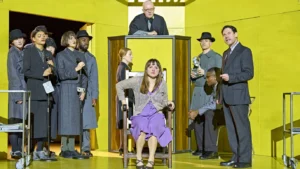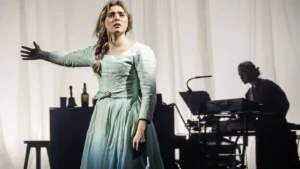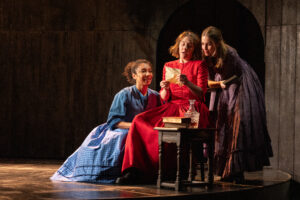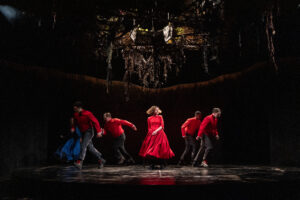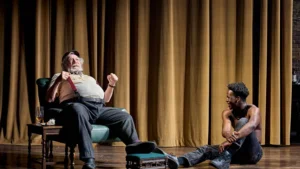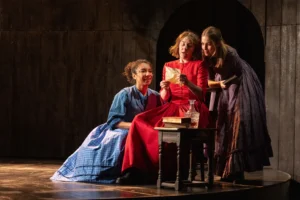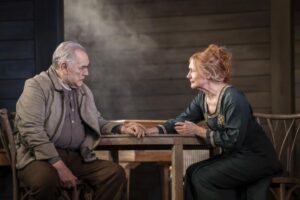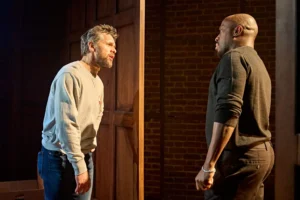Kiln Theatre
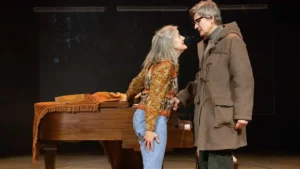
Emma John writing for explained the plot of Samuel Adamson’s new play: ‘two friends reconnect late in life, and what follows is a journey backward and forward through their timeline, exploring the love of music that brought them together and the events that have pushed them apart.’
[Links to full reviews are included but a number are behind paywalls and therefore may not be accessible]
Marianka Swain in The Telegraph 4 ‘a spellbinding showcase for the perfectly in-tune Sophie Thompson and Charles Edwards.’ ‘this is a rich reckoning with our younger selves, with talent, desire, art and absolution, led by two actors who together create a great emotional symphony.’ She concluded: ‘the revelation of the moments that have made them, as well as the missed connections that define them, are a powerful reminder of what we owe to each other.’ The critics nearly all agreed that the two central performances were powerful but disagreed about whether the time-jumping script worked or confused.
[Links to full reviews are included but a number are behind paywalls and therefore may not be accessible]
Tim Bano of The Independent (4★) was one of those who loved it, calling it ‘a big sweeping symphony of sexual identity and music…really good, really funny and really smart’. ‘Adamson writes brilliant dialogue,’ he said. He reserved special praise for the two leads: ‘It’s amazing to see the way they spin around each other during these long scenes, like magnets, sometimes attracting and sometimes repelling.’ ‘
Tom Wicker at Time Out (4★) also found them impressive: ‘As Hattie, a charismatic Thompson seems to disrupt the very air around her, sandpaper raw in a world determined to box her in. Edwards holds himself with excruciatingly effective tightness, clipping his lines with the simmering precision of a desk clerk who might be about to throw his typewriter out of the window.’
Clive Davis in The Times (3★) also praised the stars but with a caution: ‘Charles Edwards and Sophie Thompson make such an intense combination that you’re almost willing to overlook the script’s wilful, self-referential tangles.’ He also found fault with the way ‘Richard Twyman’s production rushes through too many key scenes.’ Sarah Hemming in The Financial Times (3★) also felt the actors were better than the play. They, she said, ‘find a spiky, intense chemistry’, and she did say the play was ‘richly textured, witty and original’ before adding, ‘it does suffer at its own hand: it’s very dense and packed, and the impressionistic whirl of periods and events sometimes makes it harder to anchor scenes, blurring their emotional impact’.
Emma Johnson commented in The Guardian (3★): ‘the revelation of the moments that have made them, as well as the missed connections that define them, are a powerful reminder of what we owe to each other.’
Lucinda Everett at WhatsOnStage (3★) disagreed about the lead actors: ‘Hattie and James’s connection never quite gets off the ground.’ She was also put off by the narrative: ‘thanks to all of the decade-hopping, the events that buffet their friendship feel oddly timed.’ Theatre Weekly‘s Oliver Valentine (3★) thought: ‘neither the characters or the play’s cliched middle-class dilemmas are interesting enough to drag out the epic saga that Adamson indulges in.’ Franco Milazzo in Broadway World (3★) was another who was unimpressed: ‘Some will find the final scene disappointingly overly sentimental, others a tearjerker of a goodbye. My hankie stayed where it was.’
Dave Fargnoli in The Stage (2★) found much to criticise: ‘(director Richard) Twyman does little to make the elusive story feel coherent, with an unevenly paced staging that rushes through the densest dialogue but slows to a crawl during poignant scenes.’
The Ballad of Hattie and James can be seen at The Kiln until May 18. Buy tickets direct from kilntheatre.com
Average critics’ rating 3.1★
Value Rating 78 (Value rating is the Average Critic Rating moderated by the typical ticket price. In theory, this means the higher the score the better value but, because of price variations, a West End show could be excellent value if it scores above 30 while an off-West End show may need to score above 60.)
If you’ve seen The Ballad of Hattie and James, please add your review and rating below

